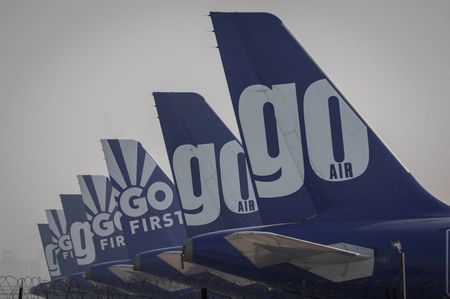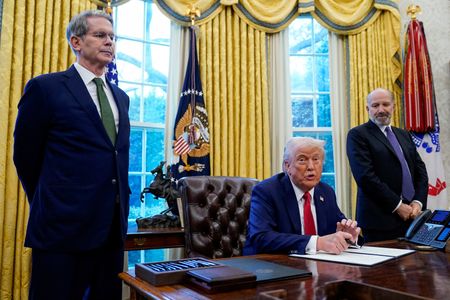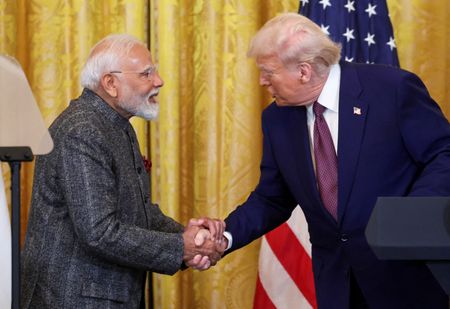By Maggie Fick and Kashish Tandon
LONDON/BENGALURU (Reuters) – Drugmaker stocks gained a temporary reprieve on Thursday as U.S. President Donald Trump spared pharmaceutical products from reciprocal tariffs, but executives and analysts warned it was premature to celebrate as tariffs were still likely to come.
Trump imposed a 10% tariff on most U.S. imports, as well as much higher levies on dozens of rivals and allies alike, but temporarily exempted some goods, including pharmaceuticals, benefiting major exporters including India, Japan and Ireland.
Shares of U.S. drugmakers AbbVie and Johnson & Johnson rose about 2%, defying the broader market drop.
Across continents, shares of Indian and European drugmakers rose, in a sign of relief that pharmaceutical products for now remained out of the crosshairs of the trade wars.
A U.S. official said on Wednesday the president plans separate tariffs targeting the pharma sector.
Trump in his White House Rose Garden announcement once again namechecked the industry, predicting that pharma companies will come “roaring back” to the U.S, and warning if they don’t, “they got a big tax to pay”.
“The administration has reinforced the need to maintain robust and resilient domestic manufacturing capacity in pharmaceuticals,” Stephen Farrelly, global pharma & healthcare lead at ING. “So it is being highlighted as a sector they needs to reshore.”
WORRIES PERSIST
Many in the industry predicted the recent uncertainty over tariffs would continue to cast a shadow over drugmakers.
“The only thing that feels certain is more uncertainty,” Barclays analyst Emily Field told Reuters.
One source at a European drugmaker said the sense on pharma sector tariffs was: “It’s not today, but it’s coming.”
Trump’s executive order listed pharmaceuticals alongside lumber, semiconductors and other sectors that could be subject to investigation under Section 232 of the 1962 U.S. Trade Act.
U.S. manufacturing costs for pharma companies will rise as country-specific tariffs will affect key supplies such as organic chemicals and glassware used to make pharma products, Bernstein analysts said in a note. They calculated an additional $45 billion of import cost risk to the pharma industry.
Jefferies analysts said Biogen and Amgen were among the drugmakers with most ex-U.S. exposure, while UBS pointed to AbbVie and Merck having significant overseas manufacturing.
Medical devices and diagnostics equipment did not appear to be exempted, and shares in companies including GE Healthcare and DexCom fell about 6%.
Medical device industry group AdvaMed said the tariffs would likely lead to cuts in research and development spending and threatened the U.S. position as a leader of innovation in the medtech sector.
(Reporting by Maggie Fick in London, Rishika Sadam in Hyderabad, Bhanvi Satija and Kashish Tandon in Bengaluru, Additional reporting by Manas Mishra in Bengaluru, Paul Arnold in Zurich, Dominique Patton in Paris and Deena Beasley in Los Angeles; Editing by Savio D’Souza, Mark Potter and Arun Koyyur)












